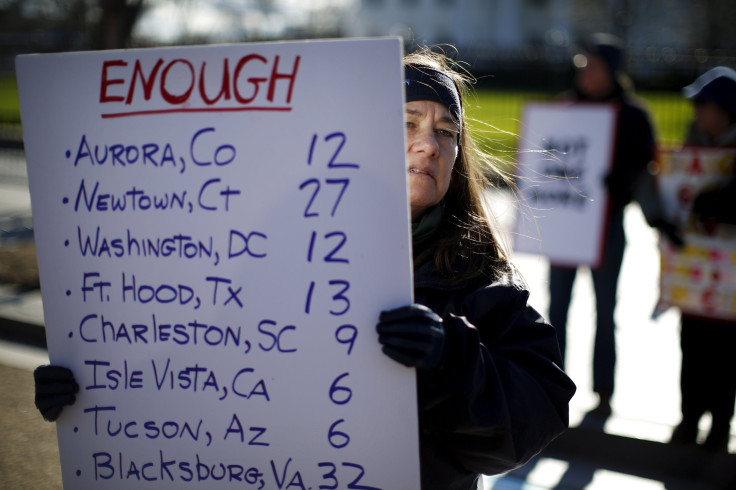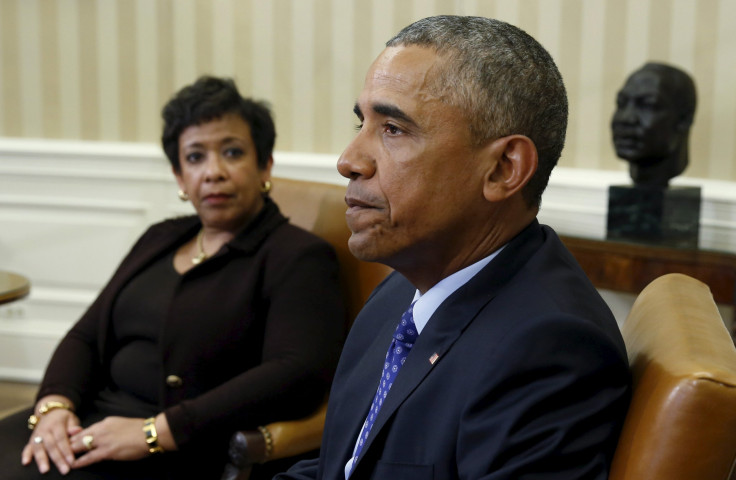Guns And Mental Illness: White House Releases New Reporting Guidelines For Background Check Database

The White House closed a de facto, if unintentional, loophole Monday for feeding information to the national database used for background checks before gun dealers can sell firearms to prospective buyers. The U.S. Department of Health and Human Services called it “an important step toward improving the public’s safety while continuing to strongly protect individuals’ privacy interests,” but critics questioned if it would reduce gun violence or even target those posing threats to society — or to themselves — when armed.
“It’s a little bit of a mixed message for policy,” said Jeffrey Swanson, a professor in psychiatry and behavioral sciences at Duke University School of Medicine in Durham, North Carolina.
The new rule, which was essentially a clarification of existing patient privacy law, spelled out who or what can share the names of people who, on the basis of mental illness, are ineligible to buy or own a firearm. It could have a major impact for some states in precluding ineligible people from buying guns, Swanson said. At the same time, he added, the existing criteria for who is or is not allowed to legally buy guns likely failed to protect certain populations — like people at risk of committing suicide — who can buy guns under existing regulations.
It could also reinforce the stigma of mental illness and the widely held perception that mental illness is a major contributor to gun violence. The final version of the rule, first proposed in 2014, was announced Monday as President Barack Obama prepared to deliver an executive order to address surging gun violence in the U.S.
Ideally, background checks are supposed to prevent firearms from falling into the wrong hands. The National Instant Criminal Background Check System (NICS) is a key part of that infrastructure, serving as a central repository that dealers must check before selling a gun to a prospective buyer.
When it comes to someone with a history of mental illness, NICS relies on states to gather and send information about the identities of those who are ineligible to buy firearms. People who have been involuntarily civilly committed to a mental institution, found incompetent to stand trial or not guilty by reason of insanity and anyone a court deems unable to manage his or her own affairs due to mental illness are all ineligible.
The problem is that the agency or organization that deals with a patient with mental illness and shares whether that person is forbidden from buying a gun varies from state-to-state. It could be a court or a public psychiatric institution, or it could be a private mental health facility. Some places, like private facilities, are subject to the Health Insurance Portability and Accountability Act, usually shortened to HIPAA, a 1996 law that protects individual health information. In other situations, “not all States report complete information to the NICS or the databases checked by it,” noted the proposed version of the rule in 2014.
The final rule, accessible through the Federal Register, noted that even though entities required to abide by HIPAA, like state health agencies, have always been legally able to pass information to NICS, "many States still were not reporting to the NICS essential information on persons prohibited from possessing firearms for reasons related to mental health." Under the new rule, only the fact that a person is prohibited from buying a gun is available through NICS; diagnoses and other health records are not.

The fact that HIPAA does not prohibit agencies from reporting the minimum amount of information, however, isn't crystal clear. "A lot of times with HIPAA there’s confusion among treatment providers about whether they can disclose information or not," said John Petrila, professor of health policy and management at the College of Public Health at the University of South Florida in Tampa.
The mere perception that HIPAA forbids a healthcare provider from reporting information is sufficient to stop them, even if doing so is not against the law. "To the degree it eliminates a perceived barrier to reporting, that it’s a good thing," Petrila said of the new rule, which itself cited a 2012 report from the U.S. Government Accountability Office that showed that "the absence of explicit State-level statutory authority to share mental health records was an impediment to making such records available to NICS."
Even as it closes a loophole, the new rule has its flaws: being simultaneously too broad and too narrow, Swanson, the Duke professor, said. "Lots of people with depression, mood disorders with a high risk of suicide don’t get involuntarily committed. They’re not prohibited persons," he said, adding, "Lots of people who are at risk aren’t even going to be susceptible to this policy." Meanwhile, not everyone with a documented history of mental illness is dangerous, but they would be subject to restrictions nonetheless.
The perceived link between mental illness and gun violence is robust, even though research has shown that less than 5 percent of gun-related killings in the U.S. from 2001 to 2010 were carried out by people found to have a mental illness.
In 2013, a poll by the Public Religion Research Institute found that more than any other measure, Americans said “better mental health screening and support” was the most important thing that could head off mass shootings in the U.S. Thirty percent of all Americans selected that option, compared to 25 percent who said stricter gun control laws and enforcement and 20 percent who said more emphasis on God and morality in school and society.
The idea that an increased focus on mental health can quell gun violence, often in lieu of specific gun control measures, remains powerful and visible in the U.S. government, too. In August, Sen. John Cornyn, R-Texas, proposed a bill (with sections endorsed by the National Rifle Association) that he said would improve the federal system of background checks to stop those with serious mental illnesses from acquiring firearms.
@velcrofin Gun deaths of children are up. Suicides w/guns are up. Total gun deaths flat since 2000. pic.twitter.com/sRWBVlTGQ6
— Jared Spool (@jmspool) December 14, 2015"It is important to note that the vast majority of Americans with mental health conditions are not violent and that those with mental illness are in fact more likely to be victims than perpetrators," the Department of Health and Human Services warned in a blog post Monday. Still, mental health advocates feared this approach could hurt people with mental illness in a variety of ways, on top of billions of dollars in slashed funding to states for mental health care in recent years.
"By linking mental health or mental illness to gun violence, you create the risk of further perpetuating that misinformation," said Ron Honberg, the director of policy and legal affairs for the National Alliance on Mental Illness, a Washington, D.C.-based advocacy group. "That misinformation serves as a real barrier to people seeking help when they need it," he added.
At the same time, a focus on mental illness also deflects attention from hot-button solutions like proposals for stricter gun control. "We really think that it is a mistake to simply zero in on mental health rather than deal with the much bigger issues in the gun control debate," Honberg said. When it comes to gun violence, mental illness was just "one piece in a thousand-piece puzzle," he said.
© Copyright IBTimes 2025. All rights reserved.






















